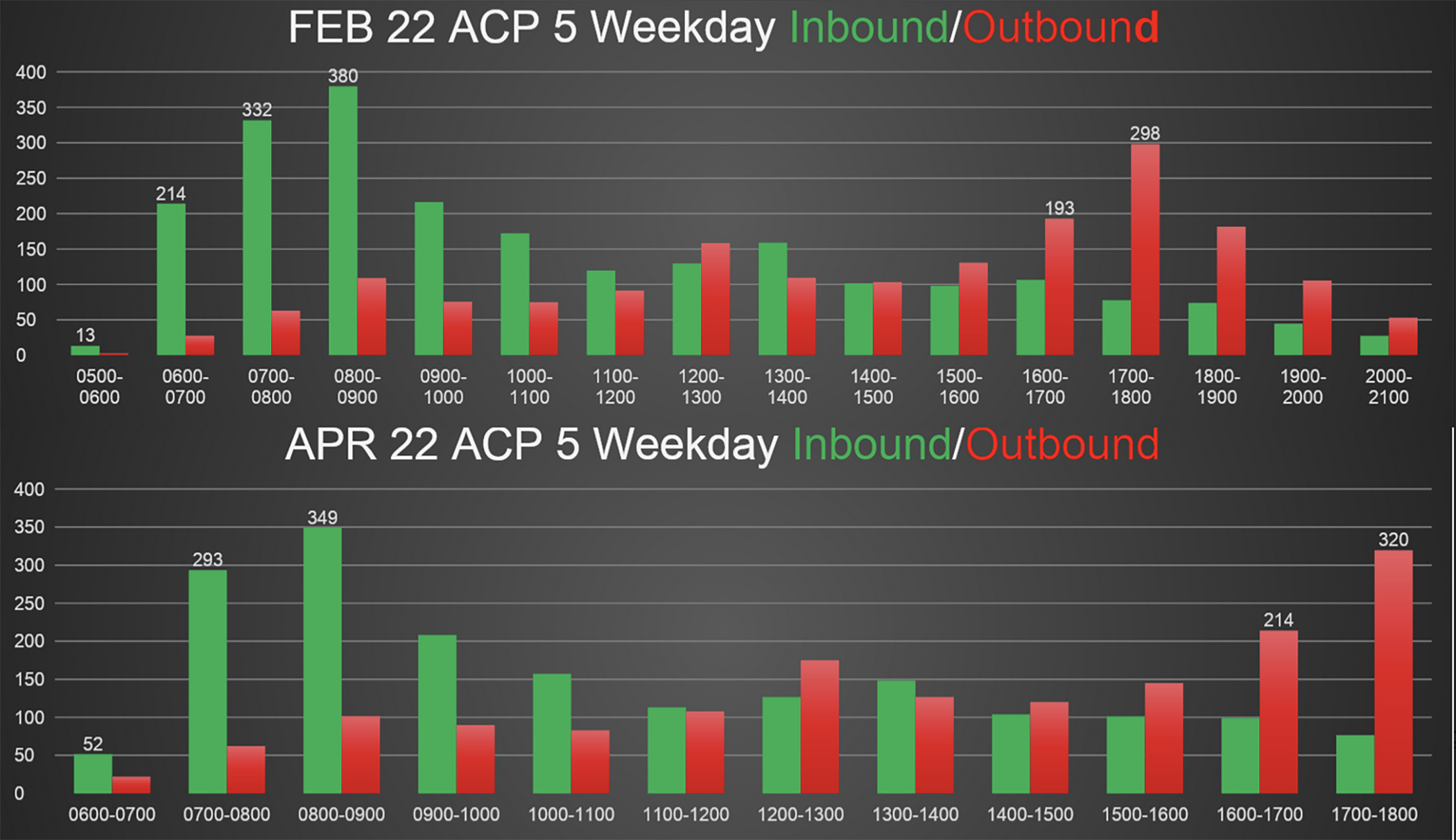DES concludes traffic study, evaluates results
ACP 5 Inbound/Outbound traffic study data.
DES
5-27-2022
FORT POLK, La. — The Fort Polk Directorate of Emergency Services conducted a traffic study on installation Access Control Points in March. The information derived from the study revealed that the major hours of usage at ACP 5 were between 6 a.m.-6 p.m. An additional traffic utilization study at ACP 5 — conducted in April — was used to determine if a change to operational hours was possible. As part of the second traffic study, the week day hours at ACP 5 were adjusted in April to 6 a.m.-6 p.m., Monday-Friday, for 30 days.
At the conclusion of the April ACP 5 traffic study, the results of usage and the impact to other ACPs was analyzed. The survey information revealed that only 52 personnel, on average, used ACP 5 between the hours of 6-7 a.m.
The majority of traffic that previously used ACP 5 between 5-7 a.m. (63 vehicles) rerouted to ACP 1 for access.
An analysis of the driving routes from a centralized location, La. Hwy 10 to the Main Shoppette via ACP 5 and ACP1, was conducted as well. The resulting data showed an average travel time of nine minutes for both routes.
However, the most significant change to ACP 5 traffic patterns was in the evening for out bound lanes. The installation has an average of more than 534 vehicles exiting ACP 5 between 5-7 p.m. daily. The data shows that there is a greater need to have ACP 5 open longer in the afternoon hours than in the morning.
As a result of this survey, ACP 5 hours have been adjusted to 7 a.m.-7 p.m. Monday-Friday. Weekend hours remain unchanged.
Some personnel accessing the installation through ACP 1 have been experiencing minor delays in the morning. For the most part, these delays are not due to ACP processing time and operations. Instead, delays are being impacted by the timing of the traffic control lights along Louisiana Avenue. As the light cycles and queues up vehicles, traffic is backed up to the ACP. The timing of these traffic lights are to be adjusted by Fort Polk’s Directorate of Public Works and Department of Transportation June 13 and should reduce delays caused by these conditions.
on installation Access Control Points in March. The information derived from the study revealed that the major hours of usage at ACP 5 were between 6 a.m.-6 p.m. An additional traffic utilization study at ACP 5 — conducted in April — was used to determine if a change to operational hours was possible. As part of the second traffic study, the week day hours at ACP 5 were adjusted in April to 6 a.m.-6 p.m., Monday-Friday, for 30 days.
At the conclusion of the April ACP 5 traffic study, the results of usage and the impact to other ACPs was analyzed. The survey information revealed that only 52 personnel, on average, used ACP 5 between the hours of 6-7 a.m.
The majority of traffic that previously used ACP 5 between 5-7 a.m. (63 vehicles) rerouted to ACP 1 for access.
An analysis of the driving routes from a centralized location, La. Hwy 10 to the Main Shoppette via ACP 5 and ACP1, was conducted as well. The resulting data showed an average travel time of nine minutes for both routes.
However, the most significant change to ACP 5 traffic patterns was in the evening for out bound lanes. The installation has an average of more than 534 vehicles exiting ACP 5 between 5-7 p.m. daily. The data shows that there is a greater need to have ACP 5 open longer in the afternoon hours than in the morning.
As a result of this survey, ACP 5 hours have been adjusted to 7 a.m.-7 p.m. Monday-Friday. Weekend hours remain unchanged.
Some personnel accessing the installation through ACP 1 have been experiencing minor delays in the morning. For the most part, these delays are not due to ACP processing time and operations. Instead, delays are being impacted by the timing of the traffic control lights along Louisiana Avenue. As the light cycles and queues up vehicles, traffic is backed up to the ACP. The timing of these traffic lights are to be adjusted by Fort Polk’s Directorate of Public Works and Department of Transportation June 13 and should reduce delays caused by these conditions.





